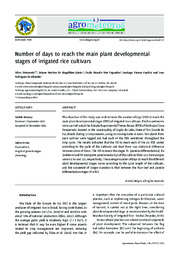Number of days to reach the main plant developmental stages of irrigated rice cultivars.
Number of days to reach the main plant developmental stages of irrigated rice cultivars.
Autoria: STEINMETZ, S.; MAGALHAES JUNIOR, A. M. de; FAGUNDES, P. R. R.; CUADRA, S. V.; ALMEIDA, I. R. de
Resumo: The objective of this study was to determine the number of days (ND) to reach the main plant developmental stages (PDS) of irrigated rice cultivars. Field experiments were carried out at the Estação Experimental Terras Baixas (ETB) of Embrapa Clima Temperado, located in the municipality of Capão do Leão, State of Rio Grande do Sul, Brazil, during 12 crop seasons, using six sowing dates in each. Ten plants from each cultivar were tagged and had each of the PDS monitored throughout the crop cycle. The results indicated that the ND to reach each of the six PDS varied according to the cycle of the cultivars and that there was statistical difference between some of them. The ND to reach the stages R1 (panicle differentiation), R4 (anthesis) and R9 (complete panicle maturity) of the cultivar IRGA 424, for example, were 63, 96 and 125, respectively. The average number of days to reach the different plant developmental stages varies according to the cycle length of the cultivars, and the subperiod of longer duration is that between the four-leaf and panicle differentiation stages (V4-R1).
Ano de publicação: 2022
Tipo de publicação: Artigo de periódico
Unidade: Embrapa Clima Temperado
Observações
1 - Por padrão são exibidas publicações dos últimos 20 anos. Para encontrar publicações mais antigas, configure o filtro ano de publicação, colocando o ano a partir do qual você deseja encontrar publicações. O filtro está na coluna da esquerda na busca acima.
2 - Para ler algumas publicações da Embrapa (apenas as que estão em formato ePub), é necessário ter, no celular ou computador, um desses softwares gratuitos. Sistemas Android: Google Play Livros; IOS: iBooks; Windows e Linux: software Calibre.
Acesse outras publicações
Acesse a Base de Dados da Pesquisa Agropecuária (BDPA) para consultar o acervo completo das bibliotecas da Embrapa.

